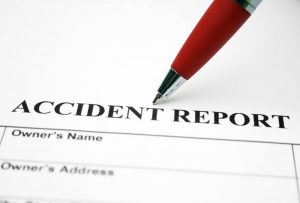 When you’re involved in a motor vehicle accident in California, if the police are called, they’ll generate an accident report. If you were injured in the accident and it was caused by someone else, you’ll need that accident report to help prove that you should be compensated for your injuries.
When you’re involved in a motor vehicle accident in California, if the police are called, they’ll generate an accident report. If you were injured in the accident and it was caused by someone else, you’ll need that accident report to help prove that you should be compensated for your injuries.
What Is a Collision Report?
According to the California Highway Patrol, there is no such thing as an accident on the road. On their website, they state, “Remember, vehicle collisions are not accidents.” In California, an accident report is called a collision report.
A collision report is a document filled out by the police officer at the scene to record the facts of the collision. They are only created if there is property damage or if injuries are involved. These completed reports are usually made available to the parties involved within ten days.
In some cases, officers might create the reports several hours after the incident occurs. At the scene, officers are often busy taking care of other priorities. They might be assisting victims, conducting traffic, or speaking with medical personnel.
What Happens if I Find Errors in the Report?
If you were injured in an accident, the police report often provides crucial evidence for proving that someone else’s actions caused your injuries. But, like all of us, police officers sometimes make mistakes. Look for any errors in your incident’s police report. If you find inaccuracies, take the time to have them corrected.
How to Get Factual Mistakes Changed
Factual errors in a collision report are errors that involve objective and verifiable facts. If you were involved in a car accident, a factual error might be that they recorded the wrong model or color of your vehicle. Or perhaps your driver’s license number was entered incorrectly.
To correct factual mistakes, it is usually enough to call the law enforcement department responsible for the police report and ask to have the information changed. Sometimes the procedure for corrections is available on the law enforcement agency’s website. If an error correction method can’t be found there, contact the officer who wrote the report and provide them with the right information.
Steps to Take if the Error Is a Disputed Fact
 Disputed facts are much less black and white in nature. They involve information about who was at fault for causing an accident or how it occurred. These are much more difficult to correct, but steps you can take include:
Disputed facts are much less black and white in nature. They involve information about who was at fault for causing an accident or how it occurred. These are much more difficult to correct, but steps you can take include:
- Show evidence that demonstrates the inaccuracy of the report. This can include medical records, witness statements, or pictures of the damaged vehicles.
- Try to get errors you notice corrected before the police report becomes final.
- Be polite when reporting the mistake to the police. Never play the blame game with them.
- In the likely case that the police officer won’t change the report, ask if you can attach a supplemental statement to it which states the error you’ve noticed.
Record Your Evidence
You should gather as much evidence and contact information as you can after a crash. If something in the accident report is wrong, the more fact-based material you have, the easier it will be to dispute the error in the report. It is important to write down everything you remember about the crash while it is fresh in your mind. Here are some important things to write down before you forget:
- What vehicle you were in at the time of the crash.
- The exact date and time that the crash occurred.
- The specific road conditions at the time of the crash. Also, include any pertinent information about the weather at the time.
- Your destination at the time of the accident.
- The names of any passengers that were with you in your vehicle at the time of the crash.
- The circumstance right before the accident occurred. Were you waiting at a stop sign? Making a left turn? Be specific and try to explain the situation clearly.
- What you saw the other vehicle do. Did they roll through a stop sign? Were there any other traffic violations that you witnessed? Again, be specific and clear.
- A description of the crash itself. How did the cars impact each other? Was there a sideswipe? A head-on collision? Describe how the vehicles ended up in relation to each other after the impact.
- How you felt immediately after the crash. Describe in detail any physical or mental effects the crash had on you, including injuries etc.
- How did the other driver or drivers react? Did they flee the scene? Were they apologetic?
Contact Jurewitz Law Group Injury & Accident Lawyers Now
The thing that sets Jurewitz Law Group Injury & Accident Lawyers apart from other firms is the one-on-one attention we provide to our clients. To achieve your goals, we take the time to get to know you and your interests. We know how frustrating it can be when someone doesn’t return your calls, so we have professionals available 24/7. Call the San Diego car accident lawyers of Jurewitz Law Group Injury & Accident Lawyers at (619) 233-5020 today.


